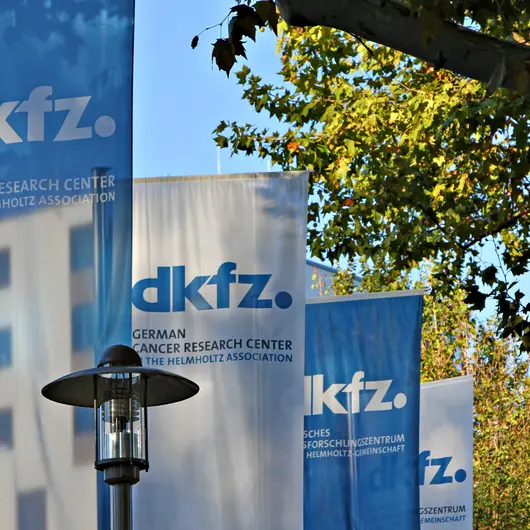
The DKFZ was founded in Heidelberg in 1964. As a member of the Helmholtz Association of German Research Centers, it is the largest biomedical research institution in Germany with more than 3,400 employees and one of the world's leading centers for cancer research. In more than 100 departments, scientists research all facets of cancer. They develop new approaches to understand how cancer develops, to make tumor diagnosis more precise and to improve the treatment of cancer patients. To this end, the DKFZ also works very closely with University Medical Centers and other research institutions, e.g. as part of the German Cancer Consortium (DKTK), the National Center for Tumor Diseases (NCT), the DKFZ-Hector Cancer Institute at the University Medical Center Mannheim, the Helmholtz Institute for Translational Oncology Mainz (HI-TRON Mainz) and the Hopp Children's Tumor Center Heidelberg (KiTZ).
Cancer prevention research at the DKFZ
An important focus of research at the DKFZ is cancer prevention: among other things, the scientists are working on identifying risk factors, improving early detection and screening techniques as well as approaches to prevent the progression of diseases and improve the quality of life of those affected. With its research, the DKFZ has established itself as an international pioneer in prevention research. One example is Harald zur Hausen's discovery that human papillomaviruses (HPV) cause cervical cancer. As a result, the first vaccine against cancer was developed, for which zur Hausen was awarded the Nobel Prize in Medicine in 2008.
The DKFZ bundles its previous prevention research activities in the National Cancer Prevention Center. Together with German Cancer Aid, it brings together all the key components of cancer prevention under one roof and intensifies its activities in this area.
Office for Cancer Prevention and WHO Collaborating Center for Tobacco Control

Founded in 1997 at the DKFZ, the Office for Cancer Prevention is committed to reducing the incidence of cancer - primarily by developing strategies to reduce tobacco and alcohol consumption and increase HPV vaccination willingness. The Office for Cancer Prevention addresses the general public, political decision-makers and healthcare professionals. The WHO Collaborating Centre for Tobacco Control supports governments and organizations with its scientific expertise in tobacco control measures.
Cancer Information Service

With the Cancer Information Service ("Krebsinformationsdienst"), the DKFZ offers those affected and their relatives, as well as healthy people, a free advisory service on the widespread disease cancer and, in this context, on preventive measures. You will find contact details and much more about the Cancer Information Service unter "Get informed".